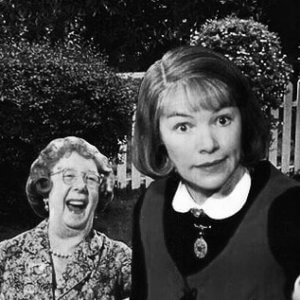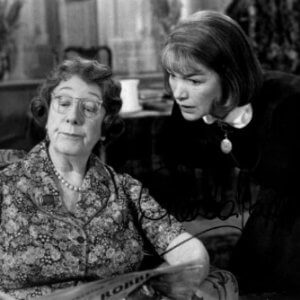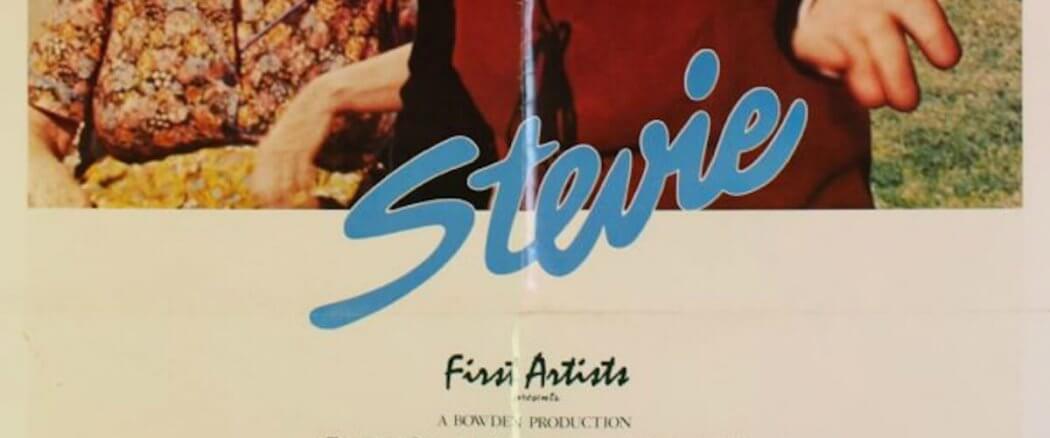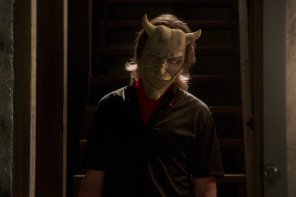If a play were to be written based on my life – baseless idea as that is – but if the thing were to be done, I’d probably ask for Hugh Whitemore. There is not another playwright of his ability: the detail of a historian, the brevity of a poet, the ambition of a novelist. His portraits of real people leave no biographical stone unturned, but only the smoothest ones, made so by suffering, are arranged in a pile, bearing witness to a life. In Whitemore’s film adaptation of his play Stevie, that life belongs to poet Florence Margaret Smith (Glenda Jackson).
Apparently the nickname Stevie originated with a riding companion remarking that she looked like the Champion Jockey Steve Donoghue. One can hope the comparison was in equestrian technique, not physical appearance. Certainly, Stevie was an experienced rider – of horses in her youth and of trains in her adulthood. “Life,” she wrote, “is like a railway station…the train of birth brings us in [and] the train of death will carry us away.” Whitemore chooses this quote to open Stevie, but he adds a line after it: “all aboard for a trip to the suburbs.”
Flavoring the Commonplace
A synopsis is expected here, and yet with Stevie, that would be a bit like serving spaghetti in a sandwich bag. It’s just the wrong container, and not very appetizing either. Whitemore’s style often utilizes asides directed to the audience, the performance of poetry or the recitation of a letter – any theatrical device that will involve us in the story. And the story is always life. How does one summarize life? Not well, judging from most obituaries, but all right, the facts were these: Stevie was a “cartoon-drawing, school-girl dress-wearing, near doggerel-spouting British poet”* who lived in the same house with her aunt (Mona Washbourne) from age three, enduring tuberculosis, Christianity, suitors and the literati.
 Now back to the opening line. It could initially be interpreted as an equation of the suburbs with death, but that’s not a very interesting – or interested – view, and neither the film, nor Stevie, would tolerate it. No, what Whitemore seems to be establishing are the patterns that comprise Stevie’s life: her daily commuting from the suburbs to London and London to the suburbs, a fixation on her “gentle friend” death, a sense of the cosmic flavoring the commonplace.
Now back to the opening line. It could initially be interpreted as an equation of the suburbs with death, but that’s not a very interesting – or interested – view, and neither the film, nor Stevie, would tolerate it. No, what Whitemore seems to be establishing are the patterns that comprise Stevie’s life: her daily commuting from the suburbs to London and London to the suburbs, a fixation on her “gentle friend” death, a sense of the cosmic flavoring the commonplace.
“It is typical of Miss Smith,” commented fellow poet Philip Larkin, “to see something poetic move where we do not, take a pot shot at it and force us to admit that there was something there, even though we have never seen anything like it before.” Or something we have seen but never known what it is.
Theology out of Loneliness
“I’m a friendship girl, you see, the rhythm of friendship is strong in my blood,” Stevie promulgates to, of all people, her fiancée. “I must go, I must come back. Here I am again, now I’m going. I love people, but I love the thought and memory of them just as much. There comes a time when I have to go away and then there comes a time when I have to come back. It’s a friendship rhythm. I’m not the marrying kind.”
 Of course years of singleness in a “house of female habitation”** might predetermine such a rhythm, just as, say, a homosexual orientation in a house of traditional Christian beliefs. Perhaps none of us are the marrying kind, with our tendency to I-Beam level everything according to our own little bubble – though some are eager to knock that off-kilter, or rather on? But after hearing Stevie’s monologue I played the friendship rhythm over a lot of my memories, and there was a beat I could follow, back to where I was. Am.
Of course years of singleness in a “house of female habitation”** might predetermine such a rhythm, just as, say, a homosexual orientation in a house of traditional Christian beliefs. Perhaps none of us are the marrying kind, with our tendency to I-Beam level everything according to our own little bubble – though some are eager to knock that off-kilter, or rather on? But after hearing Stevie’s monologue I played the friendship rhythm over a lot of my memories, and there was a beat I could follow, back to where I was. Am.
“I suppose it’s because we are lonely,” Stevie reasons, at her sleeping aunt’s bedside, amidst one of Director of Photography Freddie Young’s several and lovely uses of lamplight; the shadow work is both naturalistic and fantastic. “Because man is so lonely, we invent God. I think we should just accept loneliness, not make a Theology out of it.” And yet, in the same scene, she describes herself as an “Anglican agnostic.” It’s almost as if Stevie is trying to be friends with God. But God always wants to be more than friends.
Death is my Servant
“I first thought of suicide when I was eight. The thought cheered me up wonderfully,” Stevie declares, later expanding, “life may be treacherous…but you can always rely on death…I realized death is my servant. He’s got to come if I call him.” It’s important to Stevie that people come when she calls: at the end of every London party appearance she insists on a lift from a car-owning friend; every entrance to the house is accompanied with an announcement of “It’s me! I’m back!” to which aunt responds, “just coming.” While friends are cross at being demoted to chauffeurs and aunts cannot keep house in perpetuity, death is always around.
In one of the film’s best exchanges, made weightless with delight by Jackson and Washbourne, aunt relays the memory of a newspaper column in which a young woman asks for advice to catch the eye of a young man at the tennis club. “Arrange to play the last set with him…” aunt recounts. “Linger hopefully, and perhaps he will see you home.” “Oh,” Jackson exclaims, perfectly sincere and sarcastic, “what a wonderful phrase – linger hopefully.” It is a wonderful phrase. Stevie wrote that she was afraid of lapsing into belief. Often I am afraid of lapsing into unbelief. Either way, I like to think God is lingering hopefully.
__________________________________________
*David Orr, “How Far Can You Press a Poet?” The Believer. April 2005.
**From Stevie Smith’s poem “House of Mercy.”





